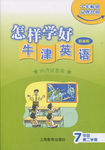题目内容
While _______ out of the window, I saw my father walking the dog in the garden.
A. look B. looking
C. looked D. having looked
B
【解析】
试题分析:考查动词时态辨析。句意:当我从窗户向外看时,我看见我爸爸在花园遛狗。句子完整的是 While I was looking out ┄.表示动作正在进行。 故选 B
考点:考查动词时态辨析。

练习册系列答案
 怎样学好牛津英语系列答案
怎样学好牛津英语系列答案
相关题目